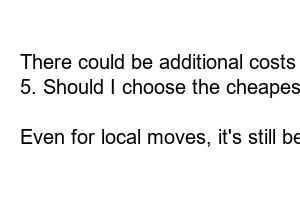이사 비용 견적 비교
Compare Moving Cost Estimates: A Comprehensive Guide
Are you planning to move to a new home or office space? If yes, then you already know that one of the most crucial aspects of a successful move is determining the cost involved. Moving companies provide cost estimates to help you gauge the financial implications of your relocation. However, with so many options available, it can be overwhelming to decide which one is the best for you. In this blog post, we will guide you on how to compare moving cost estimates effectively, so you can make an informed decision and ensure a hassle-free move.
1. **Understanding the Different Types of Moving Estimates**
Moving companies typically offer three types of moving estimates: binding estimates, non-binding estimates, and binding not-to-exceed estimates. A binding estimate guarantees the total cost of your move, while a non-binding estimate is an approximate cost that may vary based on the final weight or volume of your belongings. On the other hand, a binding not-to-exceed estimate ensures that you won’t pay more than the estimated amount, even if the actual costs exceed the initial estimate.
2. **Comparing the Inclusions and Exclusions**
Before comparing cost estimates, it’s crucial to understand what services and items are included or excluded in each estimate. Some movers may provide additional services like packing and unpacking, furniture assembly, or storage, while others may charge extra for these services. Make sure you have a clear understanding of what is covered and what is not to avoid any surprises during or after your move.
3. **Evaluating the Credibility of the Moving Companies**
Researching and evaluating the credibility of moving companies is essential to avoid scams or subpar services. Make sure the companies you are considering have the necessary licenses and insurance coverage. Check their online reviews and ratings to get an idea of their reputation and reliability. Don’t hesitate to ask for references from friends, family, or colleagues who have recently moved.
4. **Comparing the Cost Estimates**
Once you have shortlisted a few moving companies, request cost estimates from each of them. Ensure that they provide detailed breakdowns of the costs involved, including transportation, packing supplies, labor, and any additional services. A comprehensive comparison will help you identify any hidden charges or discrepancies in the estimates.
5. **Considering the Delivery Window**
The delivery window refers to the time it takes for your belongings to reach their destination. Some moving companies offer faster delivery options at a higher cost, while others prioritize cost-effectiveness but may take longer to deliver your items. Consider your timeline and priorities when comparing the estimates to select the option that aligns with your needs.
6. **Seeking Clarification and Customization**
Don’t hesitate to seek clarification from the moving companies if you have any questions or concerns about the estimates. A reputable company will be transparent and willing to address your queries. Additionally, you can also request customized estimates that cater to your specific requirements, enabling you to get a clearer picture of the costs involved.
In summary, comparing moving cost estimates is crucial to ensure a smooth and cost-effective move. By understanding the different types of estimates, evaluating the inclusions and exclusions, assessing the credibility of moving companies, and conducting a detailed comparison, you can make an informed decision. Remember to consider the delivery window and seek clarification or customization when necessary. Happy moving!
FAQs:
1. Can I trust online moving cost estimate calculators?
Online moving cost estimate calculators can give you a rough idea of the cost, but it’s always recommended to get a personalized estimate from a moving company. These calculators may not account for specific factors that can influence the final cost.
2. How far in advance should I request moving cost estimates?
It’s advisable to request moving cost estimates at least four to six weeks before your planned move to ensure ample time for comparison and decision-making.
3. What should I do if the moving estimate is higher than my budget?
If the moving estimate exceeds your budget, consider discussing your requirements with the moving company to explore possible options for cost reduction. They may suggest alternatives or offer discounts to accommodate your budget.
4. Are there any additional costs that I should be aware of?
There could be additional costs involved in your move, such as fees for specialty items, long carry charges, or elevator fees. Make sure to ask the moving company for a comprehensive breakdown of potential additional costs.
5. Should I choose the cheapest moving estimate?
While cost is an important factor, it’s not the only criterion for choosing a moving company. Consider their reputation, experience, and the services they offer to ensure a successful and stress-free move.
6. Is it necessary to compare moving cost estimates for local moves?
Even for local moves, it’s still beneficial to compare moving cost estimates. Different moving companies may have varying pricing structures and service quality, so comparing estimates can help you make an informed decision.

